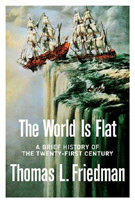The World Is Flat
(单词翻译:单击)
|
The World Is Flat: A Brief History of the Twenty-first Century
|
 |
Author: Thomas L. Friedman |
|
| Book description | |
|
Thomas L. Friedman is not so much a futurist, which he is sometimes called, as a presentist. His aim, in his new book, The World Is Flat, as in his earlier, influential1 Lexus and the Olive Tree, is not to give you a speculative2 preview of the wonders that are sure to come in your lifetime, but rather to get you caught up on the wonders that are already here. The world isn't going to be flat, it is flat, which gives Friedman's breathless narrative3 much of its urgency, and which also saves it from the Epcot-style polyester sheen that futurists--the optimistic ones at least--are inevitably4 prey5 to. What Friedman means by "flat" is "connected": the lowering of trade and political barriers and the exponential technical advances of the digital revolution have made it possible to do business, or almost anything else, instantaneously with billions of other people across the planet. This in itself should not be news to anyone. But the news that Friedman has to deliver is that just when we stopped paying attention to these developments--when the dot-com bust6 turned interest away from the business and technology pages and when 9/11 and the Iraq War turned all eyes toward the Middle East--is when they actually began to accelerate. Globalization 3.0, as he calls it, is driven not by major corporations or giant trade organizations like the World Bank, but by individuals: desktop7 freelancers8 and innovative9 startups all over the world (but especially in India and China) who can compete--and win--not just for low-wage manufacturing and information labor10 but, increasingly, for the highest-end research and design work as well. (He doesn't forget the "mutant supply chains" like Al-Qaeda that let the small act big in more destructive ways.) Friedman tells his eye-opening story with the catchy11 slogans and globe-hopping anecdotes12 that readers of his earlier books and his New York Times columns will know well, and also with a stern sort of optimism. He wants to tell you how exciting this new world is, but he also wants you to know you're going to be trampled13 if you don't keep up with it. His book is an excellent place to begin. |
 收听单词发音
收听单词发音
1
influential

|
|
| adj.有影响的,有权势的 | |
参考例句: |
|
|
|
2
speculative

|
|
| adj.思索性的,暝想性的,推理的 | |
参考例句: |
|
|
|
3
narrative

|
|
| n.叙述,故事;adj.叙事的,故事体的 | |
参考例句: |
|
|
|
4
inevitably

|
|
| adv.不可避免地;必然发生地 | |
参考例句: |
|
|
|
5
prey

|
|
| n.被掠食者,牺牲者,掠食;v.捕食,掠夺,折磨 | |
参考例句: |
|
|
|
6
bust

|
|
| vt.打破;vi.爆裂;n.半身像;胸部 | |
参考例句: |
|
|
|
7
desktop

|
|
| n.桌面管理系统程序;台式 | |
参考例句: |
|
|
|
8
freelancers

|
|
| n.自由作家,自由记者( freelancer的名词复数 ) | |
参考例句: |
|
|
|
9
innovative

|
|
| adj.革新的,新颖的,富有革新精神的 | |
参考例句: |
|
|
|
10
labor

|
|
| n.劳动,努力,工作,劳工;分娩;vi.劳动,努力,苦干;vt.详细分析;麻烦 | |
参考例句: |
|
|
|
11
catchy

|
|
| adj.易记住的,诡诈的,易使人上当的 | |
参考例句: |
|
|
|
12
anecdotes

|
|
| n.掌故,趣闻,轶事( anecdote的名词复数 ) | |
参考例句: |
|
|
|
13
trampled

|
|
| 踩( trample的过去式和过去分词 ); 践踏; 无视; 侵犯 | |
参考例句: |
|
|
|




